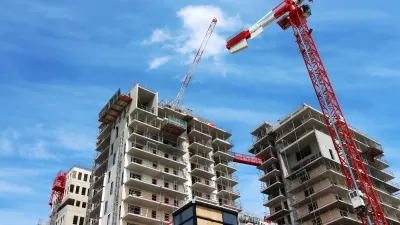A recession is coming, though we don't know how big it will be or how long it will last. Compared to the Great Recession, the housing market could potentially help, rather than hurt, economic recovery, according to the analysis shared here.

"Although it’s too soon to say how far the economy will fall and when the slide will end, the housing industry may be poised to help lead the recovery, when it occurs, unlike it was after the Great Recession of the late 2000s," writes Daniel McCue.
Interest rates allow the housing market to lead the country out of, according to the article, as has been the case in past downturns.
Simply put, this is because recessions lead to a decline in interest rates that lowers borrowing costs for both homebuyers and builders, which makes homebuying more attractive and spurs homebuilding and the many related durable consumer goods industries that drive GDP growth. The strong connection has been documented by economists such as Edward Leamer, whose 2007 working paper goes so far as to carry the title, “Housing Is the Business Cycle.”
After detailing the methodology of studies that quantify the connection between the housing market and economic recovery, McCue also documents the differences between the current economic downturn of the coronavirus and the circumstances of the Great Recession. According to McCue, "one key difference between the Great Recession and today is the lack of a substantial overhang of distressed and foreclosed properties, which after the last recession needed to be absorbed before housing construction could be a driver of recovery."
McCue also notes that the suspension of housing construction projects, as mandated in many parts of the country during the worst of the coronavirus outbreak, will contribute to housing shortages in an already tight housing market—in another fundamental difference from the previous recession.
While McCue focuses on the redemptive potential of a tight housing market, others, like a team of researchers at the Urban Institute, have expressed concern that the tight housing market will only exacerbate the pre-existing inequalities in both the housing market and the larger economy.
FULL STORY: HOUSING COULD HELP LEAD THE POST-COVID ECONOMIC RECOVERY

Planetizen Federal Action Tracker
A weekly monitor of how Trump’s orders and actions are impacting planners and planning in America.

Chicago’s Ghost Rails
Just beneath the surface of the modern city lie the remnants of its expansive early 20th-century streetcar system.

San Antonio and Austin are Fusing Into one Massive Megaregion
The region spanning the two central Texas cities is growing fast, posing challenges for local infrastructure and water supplies.

Since Zion's Shuttles Went Electric “The Smog is Gone”
Visitors to Zion National Park can enjoy the canyon via the nation’s first fully electric park shuttle system.

Trump Distributing DOT Safety Funds at 1/10 Rate of Biden
Funds for Safe Streets and other transportation safety and equity programs are being held up by administrative reviews and conflicts with the Trump administration’s priorities.

German Cities Subsidize Taxis for Women Amid Wave of Violence
Free or low-cost taxi rides can help women navigate cities more safely, but critics say the programs don't address the root causes of violence against women.
Urban Design for Planners 1: Software Tools
This six-course series explores essential urban design concepts using open source software and equips planners with the tools they need to participate fully in the urban design process.
Planning for Universal Design
Learn the tools for implementing Universal Design in planning regulations.
planning NEXT
Appalachian Highlands Housing Partners
Mpact (founded as Rail~Volution)
City of Camden Redevelopment Agency
City of Astoria
City of Portland
City of Laramie





























